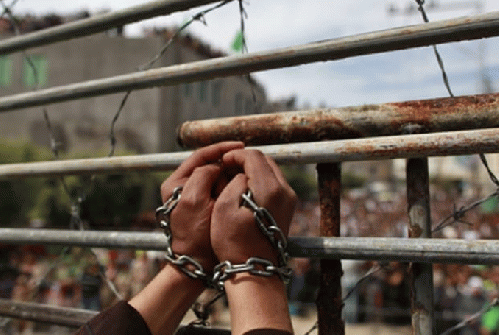From Palestine Chronicle

Palestinian prisoners have, without question, demonstrated their tenacity and ability to devise ways to resist the Israeli occupier throughout the years.
(Image by Photo Ramzy Baroud via AJE) Details DMCA
The current violence targeting Palestinian prisoners in Israeli jails dates back to January 2. It was then that Israel's Public Security Minister, Gilad Erdan declared that the "party is over."
"Every so often, infuriating pictures appear of cooking in the terrorist wings. This party is coming to an end," Erdan was quoted in the Jerusalem Post.
Then, the so-called Erdan's Committee recommended various measures aimed at ending the alleged "party," which included placing limits on prisoners' use of water, banning food preparations in cells, and installing jamming devices to block the alleged use of smuggled cell phones.
The last measure, in particular, caused outrage among prisoners, for such devices have been linked to severe headaches, fainting, and other long-term ailments.
Erdan followed his decision with a promise of the "use of all means in (Israel's) disposal" to control any prisoners' protests in response to the new restrictions.
The Israel Prison Service (IPS) "will continue to act with full force" against prison "riots," he said, as reported by the Times of Israel.
That "full force" was carried out on January 20 at the Ofer Military Prison near Ramallah, in the West Bank, where a series of Israeli raids resulted in the wounding of more than 100 prisoners, many of whom sustaining bullet wounds.
The Nafha and Gilboa prisons were also targeted with the same violent pattern.
The raids continued, leading to more violence in the Naqab Prison on March 24, this time conducted by the IPS force, known as the Metzada unit.
Metzada is IPS' "hostage rescue special operation" force and is known for its very violent tactics against prisoners. Its attack on Naqab resulted in the wounding of many prisoners, leaving two in critical condition. Palestinian prisoners fought back, reportedly stabbing two prison-guards with sharp objects.
On March 25, more such raids were conducted, also by Metzada, which targeted Ramon, Gilboa, Nafha and Eshel prisons.
In response, the leadership of Palestinian prisoners adopted several measures including the dismantling of the regulatory committees and any other form of representation of prisoners inside Israeli jails.
The decentralization of Palestinian action inside Israeli prisons would make it much more difficult for Israel to control the situation and would allow prisoners to use whichever form of resistance they may deem fit.
But why is Israel provoking such confrontations when Palestinian prisoners are already subjected to a most horrid existence and numerous violations of international law?
(Note: You can view every article as one long page if you sign up as an Advocate Member, or higher).




